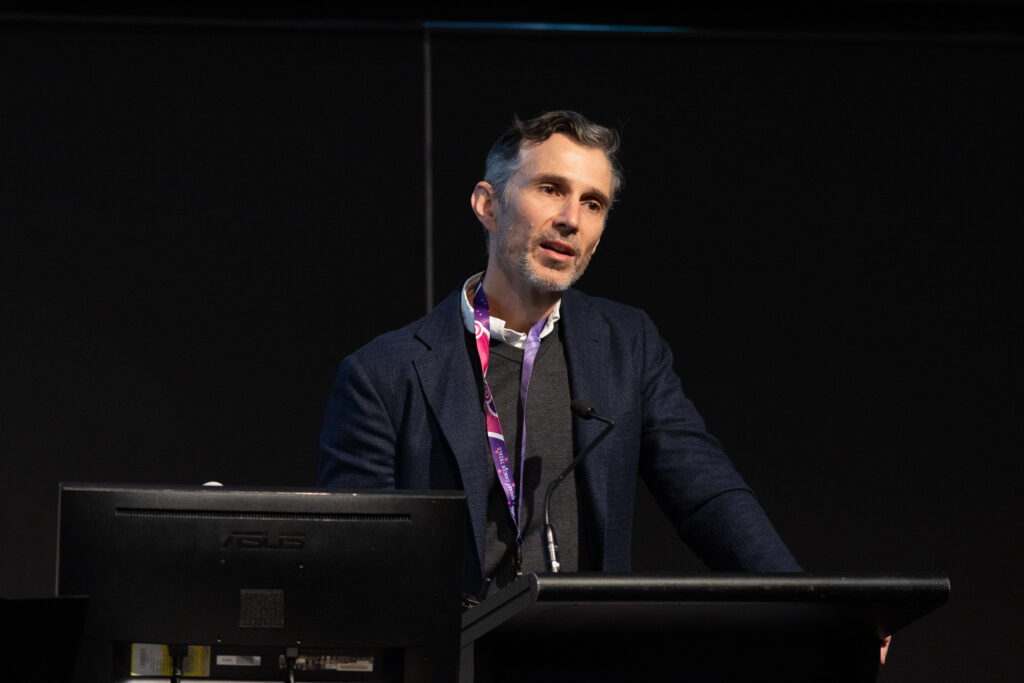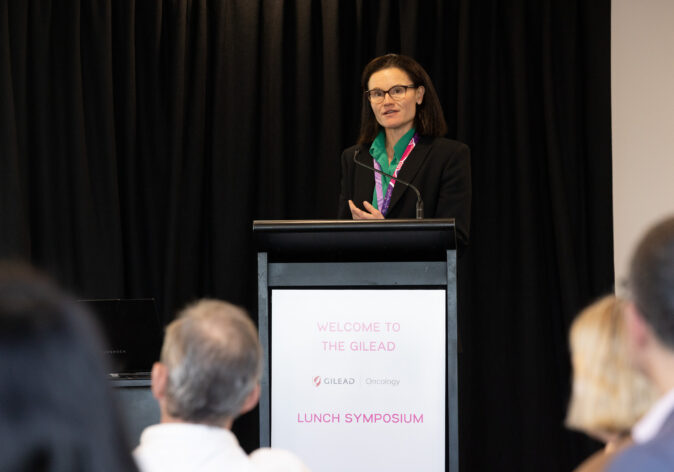Facing the Fear: Life After Breast Cancer
For many breast cancer survivors, finishing treatment isn’t the end of the journey – it’s the beginning of new fears. Fear of recurrence is one of the most common and distressing challenges patients face.
“I am a Cancer Institute, New South Wales, Career Development Fellow, and a Senior Implementation Scientist at the Daffodil Center, which is a joint venture between Sydney University and Cancer Council, New South Wales. The focus of my work is on translating evidence into practice, particularly in the context of survivorship care.”
Listen to the podcast
Associate Professor Ben Smith unpacks why these fears occur, how they affect daily life, and what strategies can help patients move forward with confidence.

Key takeaways
-
Fear of recurrence is common and persistent – Around 60% of cancer survivors experience moderate to severe fear of recurrence, which can persist for many years after treatment if left unaddressed, regardless of clinical characteristics.
-
Impact on wellbeing is significant – These fears can trigger anxiety, depression, social withdrawal, and misinterpretation of physical symptoms (e.g., aches and pains) as signs of cancer returning, affecting both mental and physical health.
-
Risk factors are more psychological than clinical – Younger age, being female, ongoing treatment side effects, and pre-existing anxiety or mental health issues increase risk, but fear is not strongly linked to cancer type, treatment received, or time since treatment.
-
Interventions exist but need broader adoption – Effective support includes psychologist-led therapy, brief clinician-delivered programs (like CIPHER), and blended online interventions with clinician support. Key strategies include normalising and validating concerns, mindfulness, relaxation training, and peer support. Clinicians are encouraged to routinely screen and openly discuss fear of recurrence.
How would you define fear of recurrence?
“It’s definitely the elephant in the room. It’s something that is incredibly common, as you say. We know about six out of 10 people living with and beyond cancer experience, moderate to severe fear of recurrence that’s associated with poorer mental health and quality of life and very common and intrusive thoughts or worries about the cancer coming back.”
“They can really make it difficult for some people in cases of severe fear of recurrence to really engage in their everyday activities but also plan for the future. But certainly, a lot of people feel quite isolated by these fears, hence why I think it’s really important that we advocate for health professionals to ask about fear of recurrence and screen people for those concerns.”
What are some of the factors that contribute to a person’s risk of experiencing high levels of recurrence?
“That’s one of the things that makes it tricky to identify a fear of recurrence in clinical practice. Despite what you might expect it’s not closely related to a person’s clinical characteristics. Things like the type of cancer they’re diagnosed with, or the type of treatment they’ve received, or the time since they’ve finished treatment. Something that we’ve found across all different types of cancer but breast cancer especially, is that it is related to age, so younger people tend to experience more fear of recurrence.”
“It’s also more common in women. And we do see it more common in people who have a greater number of side effects from their diagnosis and treatment, and those who have pre-existing anxiety or mental health issues. But yeah, it’s not an easy thing to say, well, a person with X, Y, Z characteristics has a fear of recurrence. Hence again, why do I think we need to be screening for this concern on a routine basis.”
“In terms of the mental health impact, we know that it can have a big impact on a person’s level of general anxiety, and it also increases the likelihood of experiencing depression. In extreme cases it can cause a lot of social isolation or withdrawal, as people feel like they can’t talk to people about it or, or don’t feel like they can relate to people who might not have had cancer.”
How does this fear impact a patient’s wellbeing?
“So, there’s an interaction between a person’s physical experience or symptoms and their fear of recurrence. So physical symptoms are one of the most common triggers for fear of recurrence. People often interpret aches and pains that they have as a sign that their cancer might come back, and that’s, again, something where health professionals can advise on which symptoms might be more indicative of recurrence or less indicative, and also what patients should do in response to those symptoms.”
“It can cause them to withdraw from those social relationships that they would otherwise, you know, get support and value from.”
Is fear of recurrence something that tends to improve over time for people?
“Yeah, so that’s the unfortunate thing. Despite what you might expect, or the intuitive expectation that fear of recurrence might reduce over time, we see that that’s not the case. In many people who have higher levels of fear of recurrence, if it’s left unaddressed, that tends to persist sometimes for many years post-treatment.”
“So, it’s really important that we don’t assume that a person who might be five years post-treatment, doesn’t have these concerns because they’re very common, even in longer-term survivors.”
Are there support resources or interventions that have shown promise in helping patients manage this fear?
“There are quite a few different interventions available now for fear of recurrence. I guess where we have the most evidence is for individual interventions delivered by a psychologist in a one-on-one kind of context. And we know that this can help people with severe fear recurrence to reduce their concerns.”
“We’ve also now got a lot of brief clinician-delivered interventions like CIPHER that Jenny Lou developed, which are designed to be incorporated into routine care and in incorporate elements such as just normalising and validating these concerns, giving prognostic information, telling people what their risk of recurrence is and what signs to look out for.”
“And those have been shown to reduce fear of recurrence typically in people with mild to moderate kind of levels of fear of recurrence. We’re still lacking some options for the large group of about four out of 10 patients who have moderate fear of recurrence. There’s been quite a bit of work done looking at online interventions with varying degrees of success.”
“We have found that for some of those interventions, the levels of engagement, and subsequent benefit are not as good as we would’ve liked. But there’s been some work done recently looking at interventions that have just a little bit of clinician support embedded into them. And we’ve found that they have much greater engagement and efficacy as well. So, I think there’s a lot of potential there for those types of interventions.”
What would you say to someone who might be a couple years post-treatment who had just started noticing that these fears are becoming more prevalent?
“Don’t be afraid to tell people or express those concerns to other people. I think it’s something that we know is very common, not only in individuals affected, but also their caregivers or support people. And just by sharing those concerns, I think it can help lighten the load for both those parties to some degree.”
“Talk to your healthcare team about it because there are support options available that they can provide as well. There are also some great resources from places like the Cancer Council and the Australian Cancer Survivorship Center on fear of Recurrence, and they include tips around things like mindfulness, which can be helpful.”
“We know that a lot of the interventions are kind of focused on not trying to eliminate these thoughts. We know that they’re almost inevitable. We’re never going to be able to get rid of them, but we can help people to live better with those concerns and not let them dominate their lives.”
“So, getting some advice around things like relaxation training and meditation and mindfulness generally can be helpful. But if you do need further help, don’t be afraid to talk to your healthcare team about it because it’s a very common and understandable concern. And there is further support available.”
“The main message for clinicians would be to ask about it. This is a very normal and understandable concern for a lot of people. So, we need to normalise and validate these concerns and make people feel comfortable talking about them. And hopefully patients realise they’re not alone in these worries and that there is help available.”
“Even peer support can be a big help in addressing these concerns as well, just understanding that other people who are going through the same thing, and sharing those concerns with them.”
QUICK ACCESS

Associate Professor Ben Smith
Support Breast Cancer Research
Listen Now: Facing the Fear – Life After Breast Cancer
Associate Professor Ben Smith unpacks why a fear of cancer recurrence occurs, how it affects daily life, and strategies that can help patients move forward with confidence.
Podcast Transcript
-
Facing the Fear: Life After Breast Cancer
For many breast cancer survivors, finishing treatment isn’t the end of the journey – it’s the beginning of new fears. Fear of recurrence is one of the most common and distressing challenges patients face. In this episode, Associate Professor Ben Smith unpacks why these fears occur, how they affect daily life, and what strategies can help patients move forward with confidence.
“I am a Cancer Institute, New South Wales, Career Development Fellow, and a Senior Implementation Scientist at the Daffodil Center, which is a joint venture between Sydney University and Cancer Council, New South Wales. The focus of my work is on translating evidence into practice, particularly in the context of survivorship care.”
Fear of recurrence is something that many people who have been diagnosed with breast cancer experience, but it’s not always openly talked about. So how would you define it and how common is it among patients?
“It’s definitely the elephant in the room. It’s something that is incredibly common, as you say. We know about six out of 10 people living with and beyond cancer experience, moderate to severe fear of recurrence that’s associated with poorer mental health and quality of life and very common and intrusive thoughts or worries about the cancer coming back.”
“They can really make it difficult for some people in cases of severe fear of recurrence to really engage in their everyday activities but also plan for the future. But certainly, a lot of people feel quite isolated by these fears, hence why I think it’s really important that we advocate for health professionals to ask about fear of recurrence and screen people for those concerns.”
What are some of the factors that contribute to a person’s risk of experiencing high levels of recurrence?
“That’s one of the things that makes it tricky to identify a fear of recurrence in clinical practice. Despite what you might expect it’s not closely related to a person’s clinical characteristics. Things like the type of cancer they’re diagnosed with, or the type of treatment they’ve received, or the time since they’ve finished treatment. Something that we’ve found across all different types of cancer but breast cancer especially, is that it is related to age, so younger people tend to experience more fear of recurrence.”
“It’s also more common in women. And we do see it more common in people who have a greater number of side effects from their diagnosis and treatment, and those who have pre-existing anxiety or mental health issues. But yeah, it’s not an easy thing to say, well, a person with X, Y, Z characteristics has a fear of recurrence. Hence again, why do I think we need to be screening for this concern on a routine basis.”
How does this fear impact on a patient’s wellbeing, both emotionally and physically?
“So, there’s an interaction between a person’s physical experience or symptoms and their fear of recurrence. So physical symptoms are one of the most common triggers for fear of recurrence. People often interpret aches and pains that they have as a sign that their cancer might come back, and that’s, again, something where health professionals can advise on which symptoms might be more indicative of recurrence or less indicative, and also what patients should do in response to those symptoms.”
“In terms of the mental health impact, we know that it can have a big impact on a person’s level of general anxiety, and it also increases the likelihood of experiencing depression. In extreme cases it can cause a lot of social isolation or withdrawal, as people feel like they can’t talk to people about it or, or don’t feel like they can relate to people who might not have had cancer.”
“It can cause them to withdraw from those social relationships that they would otherwise, you know, get support and value from.”
Have you found that fear of recurrence is something that tends to improve over time for people, or is it normally that they have it and then that’s kind of it?
“Yeah, so that’s the unfortunate thing. Despite what you might expect, or the intuitive expectation that fear of recurrence might reduce over time, we see that that’s not the case. In many people who have higher levels of fear of recurrence, if it’s left unaddressed, that tends to persist sometimes for many years post-treatment.”
“So, it’s really important that we don’t assume that a person who might be five years post-treatment, doesn’t have these concerns because they’re very common, even in longer-term survivors.”
Are there support resources or interventions that have shown promise in helping patients manage this fear?
“There are quite a few different interventions available now for fear of recurrence. I guess where we have the most evidence is for individual interventions delivered by a psychologist in a one-on-one kind of context. And we know that this can help people with severe fear recurrence to reduce their concerns.”
“We’ve also now got a lot of brief clinician-delivered interventions like CIPHER that Jenny Lou developed, which are designed to be incorporated into routine care and in incorporate elements such as just normalising and validating these concerns, giving prognostic information, telling people what their risk of recurrence is and what signs to look out for.”
“And those have been shown to reduce fear of recurrence typically in people with mild to moderate kind of levels of fear of recurrence. We’re still lacking some options for the large group of about four out of 10 patients who have moderate fear of recurrence. There’s been quite a bit of work done looking at online interventions with varying degrees of success.”
“We have found that for some of those interventions, the levels of engagement, and subsequent benefit are not as good as we would’ve liked. But there’s been some work done recently looking at interventions that have just a little bit of clinician support embedded into them. And we’ve found that they have much greater engagement and efficacy as well. So, I think there’s a lot of potential there for those types of interventions.”
What would you say to someone who might be a couple years post-treatment who had just started noticing that these fears are becoming more prevalent?
“Don’t be afraid to tell people or express those concerns to other people. I think it’s something that we know is very common, not only in individuals affected, but also their caregivers or support people. And just by sharing those concerns, I think it can help lighten the load for both those parties to some degree.”
“Talk to your healthcare team about it because there are support options available that they can provide as well. There are also some great resources from places like the Cancer Council and the Australian Cancer Survivorship Center on fear of Recurrence, and they include tips around things like mindfulness, which can be helpful.”
“We know that a lot of the interventions are kind of focused on not trying to eliminate these thoughts. We know that they’re almost inevitable. We’re never going to be able to get rid of them, but we can help people to live better with those concerns and not let them dominate their lives.”
“So, getting some advice around things like relaxation training and meditation and mindfulness generally can be helpful. But if you do need further help, don’t be afraid to talk to your healthcare team about it because it’s a very common and understandable concern. And there is further support available.”
“The main message for clinicians would be to ask about it. This is a very normal and understandable concern for a lot of people. So, we need to normalise and validate these concerns and make people feel comfortable talking about them. And hopefully patients realise they’re not alone in these worries and that there is help available.”
“Even peer support can be a big help in addressing these concerns as well, just understanding that other people who are going through the same thing, and sharing those concerns with them.”



